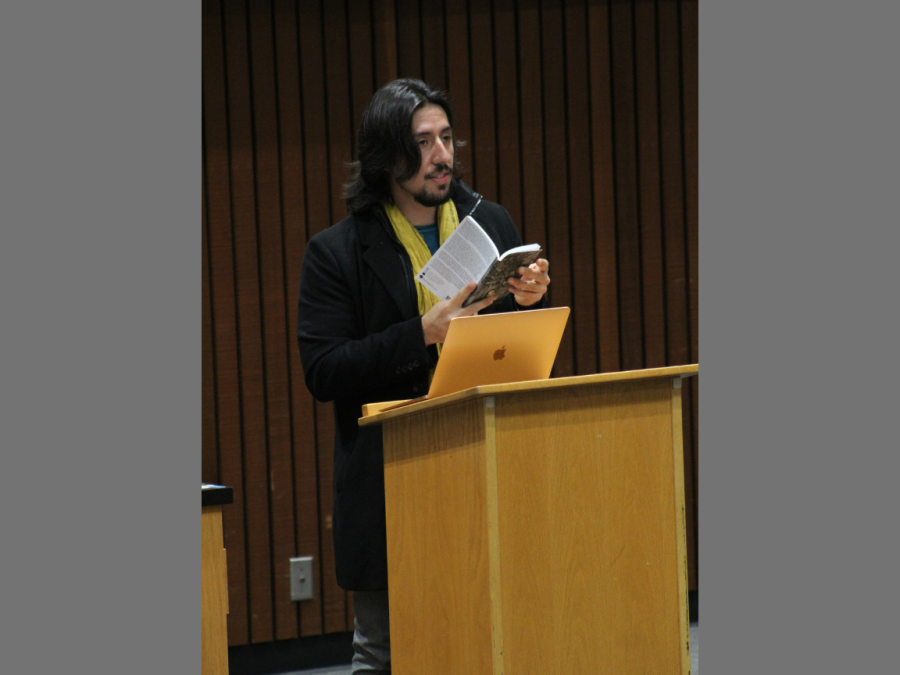English professor shares memoir about his struggles
A book reading was held by Cosumnes River College English Professor José Alfaro in the library forum on Thursday. Alfaro speaks about his book called “Something More Splendid Than Two,” which is a personal memoir about events and struggles he has gone through.
Students and staff gathered for a book reading held by a Cosumnes River College English professor on Thursday.
English Professor José Alfaro presented his book titled “Something More Splendid Than Two.” The reading was organized by Puente and the Professional Development Committee and was held in the CRC Library Forum.
Alfaro said his book was a personal memoir detailing events and struggles he had gone through. He said that the book began as a dissertation he had written when he was completing his “first few years as an instructor at CRC.” When he was writing it and confronted the themes of his research, he said he was also confronting some internal pain he went through at the time, which came from his experiences in a culture that trained them to “practice patriarchal domination.”
Alfaro said that memoir writing wasn’t welcome in academic writing, and that students were discouraged from making themselves present or known in their research. However, he also said that he wanted to experiment and practice creativity in writing his memoir.
“I tell people it took me two years to sit and write the book, but it took me five years to think about,” Alfaro said. “I had to write a lot of other things before I was ready to write the book. In some ways, some of the ideas I started cultivating 10 years ago. The first ideas I had as an undergraduate student were also part of the process of writing this book, though I didn’t know it at the time.”
Alfaro said the memoir wasn’t initially supposed to be a book and that he “wrote it freely.” However, a friend of his read the memoir and convinced him to publish it as a book. One of his primary inspirations for writing it was his mother.
“My mother is the primary inspiration because she gave me the language and courage to begin telling the story,” Alfaro said. “I was also deeply inspired by other writers and thinkers like Toni Morrison, Audre Lorde, Gloria Anzaldúa, José E. Muñoz, etc.”
A Q&A session was also held with the audience after Alfaro was done reading excerpts from the book.
Lauren Ballesteros, a TRIO student support specialist, said the reading was inspiring and that being a part of the Latinx community, some of the excerpts resonated with her.
“One part that resonated with me was when he mentioned that we are often said that we should live or be a certain way, and his exact words were that he was told to write a certain way,” Ballesteros said. “Oftentimes we are classified in certain groups and we are not able to be our true selves.”
Melissa Sanchez, a success coach and student support specialist for MI CASA, said she related to the subject of Alfaro’s book because she is also a first-generation Latinx scholar. Sanchez said she was “in the same boat” because she is writing a thesis that aligns with Alfaro’s experiences because she had experienced some of “that push-back” from other people who had read her work.
“I think José is an amazing person to support,” Sanchez said. “I know he has amazing things coming his way in the future and this is just the beginning. His book is 100% worth the read.”
Alina Cortes-Quintana, an analyst for the California Community College Chancellor’s Office, said the reading was a powerful experience to sit and learn about the work that CRC faculty are putting together with student experience in mind. Cortes-Quintana also said the experience was empowering for herself as a woman of color.
“There were a lot of things I related to, such as ‘imposter syndrome,’ culture, belonging, experiences through academia and a desire to be your authentic self,” Cortes-Quintana said.

